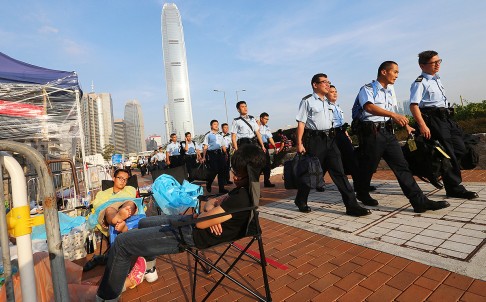World powers split over Occupy, but most agree that Beijing unlikely to budge
PUBLISHED : Monday, 06 October, 2014, 5:00pm
UPDATED : Monday, 06 October, 2014, 9:04pm
Toh Han Shih

Police officers arrive at the chief executive's office in Admiralty as Occupy Central protesters camp out. Photo: David Wong
Foreign ministers and experts from around the world have been voicing very differing opinions on the Occupy Central movement, ranging from sympathy for the protesters, or support for Beijing. Yet they all seem to agree one on thing: it's not likely that Beijing will be swayed by the scale of recent protests in Hong Kong.
On October 5, the US-China Economic and Security Review Commission (USCC), a US government body that advises US Congress on Sino-US relations, said, “We support an open and democratic system in Hong Kong based on universal suffrage, freedom of expression, and freedom of assembly.
"We urge Hong Kong’s leadership to adopt an election process based on universal suffrage which provides a genuine choice of candidates representing the true aspirations of the Hong Kong people. We urge Hong Kong and Chinese authorities to exercise restraint and respect protesters’ right to express their views in a peaceful manner.”
In an interview with the Washington Post published on October 2, Jeff Bader, a former Asia adviser to US President Barack Obama, said that Beijing would likely stick to its position on Occupy Central.
“None of us should delude ourselves that there could be a change of heart or softness coming from China just around the corner,” Bader said.
He said he expected the Occupy Central protests would not last much longer.
“It’s unrealistic to think that millions of Hongkongers are going to remain supportive, or even tolerant, over [the] weeks as the city grinds to a halt. Sympathies are going to shift if it continues. People may be sympathetic, but reality and the needs of daily life intrude. So [Hong Kong chief executive Leung Chun-ying’s] strategy so far of watching and waiting is not stupid,” Bader added.
On October 1, the White House said President Obama and National Security Adviser Susan Rice expressed their hope that differences between Hong Kong authorities and protesters would be addressed peacefully.
“The United States has consistently supported the open system that is essential to Hong Kong’s stability and prosperity, universal suffrage, and the aspirations of the Hong Kong people,” the White House said in a statement.
On October 5, Charles Powell, who served as private secretary to then British Prime Minister Margaret Thatcher when Britain agreed to return Hong Kong to China during the 1980s, told the BBC he did not believe the protest would bring about change.
“The position about elections has been clear since the law was published in 1991 and I don’t believe for one moment that Chinese are going to change that basic position,” Powell said, adding: “Hong Kong has always been part of China. We rented it for a while and we didn’t introduce democracy.”
The British peer is now a director of a Hong Kong property developer, Hong Kong Land Holdings, and chairman of the UK government’s Asia Task Force.
On October 4, Singapore Foreign Minister K. Shanmugam was quoted by local media as saying China was unlikely to give in to the demands of Occupy Central protesters, as doing so could affect China’s stability.
“China will be firm – it is not going to institute any major political change to copy Western models in the short term. The leadership believes that any such move would be disastrous for China and could hurt the people of China,” Shanmugam said.
There has been lots of anti-China bias in Western media reports, Shanmugam continued, noting that Western reports often stated that China is denying democracy and impacting on the freedoms that helped Hong Kong become successful.
Hong Kong did not have a democratic system for 150 years under British rule, yet Hong Kong still prospered, Shanmugam said.
The Sino-British Joint Declaration of 1984 does not mention universal suffrage, and Beijing’s proposal is “more than what Hong Kong ever had under the British” – a point which the Western media have missed, Shanmugam said.
"Occupy Central protesters in Hong Kong need to understand that China has acted in accordance with the Basic Law," Shanmugam said.
Protesters need to understand Hong Kong’s “extreme reliance” on China for jobs and their livelihood. There needs to be a clear understanding of China’s largesse towards Hong Kong even as an anti-China mood is stoked up. Is the average Hongkonger prepared for the trade-offs?”, Shanmugam concluded.
